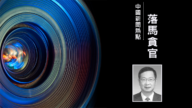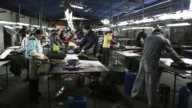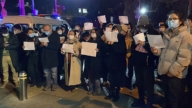【新唐人2011年11月21日讯】关注时政话题的电子杂志《阳光时务》在10月初被迫停刊之后,中国国务院新闻办再发出通知,禁止网民下载《阳光时务》,杂志出版相关者的微博账户也被删除。杂志主编长平指出:限制舆论自由对于老百姓和执政者都不利。
11月18号,网络上传出中国国务院新闻办的一则通知,禁止网民下载香港《阳光卫视》旗下电子杂志《阳光时务》。此外,杂志出版人在中国大陆的微博全面被禁,包括香港《阳光卫视》总裁陈平、《阳光时务》主编长平,以及原名温云超的《阳光卫视》新媒体总监北风。此外,新浪腾讯《网易》微博已经屏蔽了《阳光时务》的搜索。
《阳光卫视》新媒体总监北风告诉《自由亚洲电台》,中共禁止下载的命令含糊不清,技术上也有困难。
北风:“我不知道他这个命令是什么意思。是指中间承载商不允许提供(下载),国内的中间承载商从来也没有主动提供过我们《阳光时务》的下载。那对于一些网络硬盘,他们有没有一些足够的检查条件去清除这些文件,我也深表怀疑。”
北风认为《阳光时务》是有需求、有生命力的媒体,要拦截有难度,不是一个禁令就可以做到。
北风:“作为一个有生命力的媒体,这是他们恐惧的主要原因。但是我也不认为他们这样做能够阻止我们的传播。关键看用户有什么样的内容需求。我想我们能够提供这些内容,提供这种醒觉性的资源,并且我们利用互联网和iphone这些新媒体的传播手段,我想要真正的去拦截我们,难度应该挺大的。”
应对中共的禁载令,《阳光时务》把发行口号定为“你一定能读到”,并在网上推出技术突破的方法,让中国大陆苹果用户通过转换区域方式就可以自由下载﹔另外,杂志也通过PDF文件形式通过邮件等发送给固定人群。《阳光时务》官方推特表示:“不管别人怎么封锁,我们都可以保证想看的人一定看得到。”
《阳光时务》原来的发行口号是“多说一点”,长平接受《德国之音》采访时说,中共连这一点都不能忍受,大陆的管制可见一斑。
长平:“我们就是稍微多说了一点,可能就让内地当局觉得受不了了,它反正就是中国内地媒体的管制状态。我们曾以为由于我们的态度还是比较克制的、比较理性的,会在一定程度内得到容忍,会在一定的时间内得到传播。没有想到从第一期开始就被严厉的封杀。”
长平认为中国目前社会问题很多,很大程度上是因为媒体被严厉控制、公众没有言论自由、信息阻塞、官员的权力没有得到监督。
《阳光时务》今年8月创刊,主要面向Android和苹果等移动设备用户提供便捷的下载阅读。被禁前报导的内容包括六四、艾未未、独立参选、新闻管制等。有传媒人士分析,《阳光时务》被封杀,敏感内容是一个主要原因。另一方面,与杂志主编长平也不无关系。2008年长平就职南方报系,他在西藏3.14事件后发表评论文章——“西藏:真相与民族主义情绪”,此后,他一直被当局打压,直到从南方报业离职。
《阳光卫视》总裁陈平说,作为中国人,媒体人也希望为中国感到自豪,但看到了中国的问题,就要说出来,“整天说吹捧、迎合的话,才是别有用心的,才是祸根。”
新唐人记者吴惟、王明宇综合报导。
iSun Affairs Banned for Telling the Truth
Since iSun Affairs, a Hong Kong e-magazine
on current Chinese affairs, ceased publishing in early October,
the China State Council started prohibiting netizens
from downloading it
In addition, key staff member micro blog accounts
were deleted.
Chang Ping, the chief editor of iSun Affairs points out that
restrictions on peoples’ freedom of opinion are harmful to society and the rulers.
On November 18, a China’s State Council notice was posted
on the Internet warning people that downloading iSun Affairs,
which is published by iSun TV, is prohibited.
In addition, a few key microblog accounts in mainland China
were deleted, including the chairman of iSun TV, Chen Ping,
the chief editor of iSun Affairs, Chang Ping, and
former iSun TV news media direct, Bei Feng.
Furthermore, the microblog, Net Ease,
has completely censored iSun Affairs.
Bei Feng tells Radio Free Asia that
the State Council’s prohibition order is unclear and technically, difficult to adhere to.
Bei Feng: “I am not clear on the meaning of this order?
Does it refer to prohibiting traders who provide the downloading service?
The traders in the mainland have never supplied iSun Affair
with downloading services.
As far as network hard drives,
I doubt the Chinese Communist Party (CCP) is capable enough to clear all the files.”
Bei Feng says iSun Affairs is a viable media
that is in high demand.
It is difficult to block and a simple prohibition order
won’t work.
Bei Feng: “the main reason the CCP fears iSun Affairs
is precisely because it is a viable media.
I don’t think they can stop us from spreading it.
It depends on what readers demand.
We can provide content that readers need
and we can provide the resources.
We use the Internet and iPhones and other new media methods
to spread it all over the world. It is very difficult for them to stop us.”
By complying to the CCP’s order,
iSun Affairs changed its company slogan to, “You will be able to read it.”
iSun Affairs also introduced unblock technologies,
helping mainland readers to download it freely.
In addition, iSun Affairs also provides picture files, via email,
to individuals.
iSun Affairs official website says: “No matter how they block us,
we guarantee you can read it!”
iSun Affairs previous slogan was “Speak more.”
Chang Ping told Deutsche Welle that the CCP cannot tolerant
this single point.
You can tell how the CCP’s corrupt system works.
Chang Ping: “We just said a little bit more than
the CCP could accept.
It reflects the mainland media management situation.
Because our opinion is very rational,
we thought maybe the CCP can tolerate us,
and we thought our media would spread this way.
On the contrary, our first issue was blocked.”
Chang Ping believes that China has many social problems,
mainly because the media is strictly controlled;
the public has no freedom of speech, information is blocked,
and government officials are not closely monitored.
iSun Affairs’ first issue was published in August
and is an e-magazine for Android and iPhone users.
The e-magazine reports on news in China,
including the Tiananmen massacre on June 4, 1989,
artist Ai Weiwei, independent candidates,
press control, and so on.
Media analysts say that iSun Affairs has been banned
for its sensitive content.
Another reason for it being banned is that chief editor,
Chang Ping, worked for Southern Metropolis Weekly in 2008.
On March 14, he published a controversial comment
relating to a Tibetan incident, which later cost him his job.
iSun TV president, Chen Ping,
said that being a Chinese journalist, he wants to be proud of China,
which is the reason why we should report the problems we see.
“Those who always publish articles praising the CCP,
with the intention of constantly trying to meet the CCP’s expectations, are actually undermining China.”
NTD reporters Wu Wei and Wang Mingyu




























